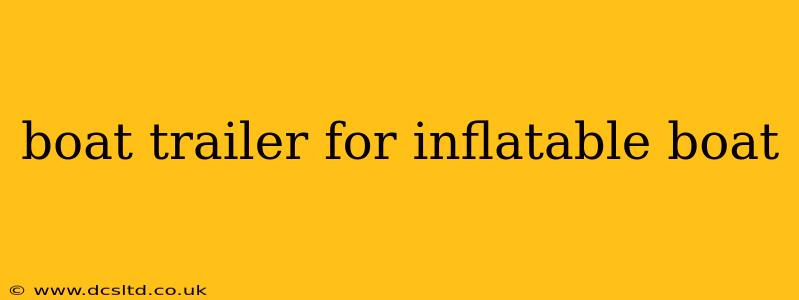Inflatable boats offer incredible portability and convenience, but transporting them safely and securely requires the right trailer. Choosing the wrong trailer can lead to damage to your boat, your vehicle, or even cause accidents. This guide will help you navigate the world of inflatable boat trailers and select the perfect one for your needs.
What are the Different Types of Inflatable Boat Trailers?
Several trailer types cater specifically to inflatable boats, each with its advantages and disadvantages. The best choice depends on the size and weight of your inflatable, your budget, and your towing vehicle.
-
Roller Trailers: These trailers use rollers to support the boat's hull, making loading and unloading easier. They are generally lighter and more affordable than other types, making them ideal for smaller inflatable boats. However, they might not be suitable for larger or heavier inflatables.
-
Bunk Trailers: Bunk trailers utilize bunks (wooden or composite supports) to cradle the boat's hull. This provides excellent support and prevents hull damage, particularly beneficial for larger or heavier inflatables. They are generally more robust and offer better stability during transport but can be heavier and more expensive than roller trailers.
-
Custom Trailers: For exceptionally large or specialized inflatable boats, a custom-built trailer might be necessary to ensure a perfect fit and optimal protection. This option offers the best fit and security but comes with a significantly higher price tag.
What Size Boat Trailer Do I Need for My Inflatable Boat?
Determining the correct trailer size is crucial. It's not simply about the inflatable's length; the overall weight, including the motor and any accessories, is critical. Always check your inflatable boat's manufacturer specifications for the maximum weight and dimensions. The trailer's weight capacity must exceed this combined weight. Don't forget to factor in the trailer's own weight when assessing your towing vehicle's capacity.
How Much Weight Can My Inflatable Boat Trailer Hold?
The weight capacity of your trailer is clearly stated on the trailer's identification plate. This is the maximum weight the trailer can safely carry. Exceeding this limit is dangerous and can lead to accidents or damage to your trailer and vehicle. Always weigh your inflatable boat fully loaded (including motor, fuel, gear, etc.) before selecting a trailer to ensure it meets the weight requirements.
What Features Should I Look for in an Inflatable Boat Trailer?
Beyond size and weight capacity, several features enhance safety and convenience:
-
Tie-Down Points: Secure tie-down points are essential to prevent the boat from shifting during transport. Multiple, robust tie-down points provide better security.
-
Lights and Reflectors: Ensure the trailer is equipped with functioning lights and reflectors for safe nighttime towing.
-
Winch: A sturdy winch makes loading and unloading the boat much easier, especially for heavier inflatables.
-
Brakes: For heavier inflatable boats or longer towing distances, consider a trailer with brakes for enhanced safety and control.
-
Spare Tire: A spare tire is a worthwhile investment to prevent delays in case of a flat tire.
-
Waterproof Bearings: These protect the trailer's wheels from water damage, prolonging the lifespan of your trailer.
Can I Use a Regular Boat Trailer for My Inflatable Boat?
While you might be able to use a standard boat trailer for a small inflatable boat, it’s often not the ideal solution. Standard trailers are usually designed for rigid hulls and might not provide the appropriate support or protection for an inflatable's softer construction. A trailer designed specifically for inflatables will generally offer better support and prevent damage.
How Do I Properly Secure My Inflatable Boat to the Trailer?
Properly securing your inflatable boat is paramount to prevent damage and ensure safe transportation. Use appropriate straps and tie-down points, ensuring the boat is firmly secured and evenly distributed on the trailer. Avoid over-tightening the straps, which could damage the boat's tubes. Refer to your trailer and inflatable boat manufacturer's instructions for detailed guidance.
By carefully considering these factors, you can choose the right boat trailer for your inflatable boat, ensuring safe and stress-free transport for years to come. Remember to always prioritize safety and consult with professionals if you have any doubts about selecting or using a trailer.
